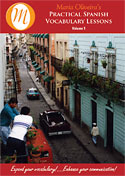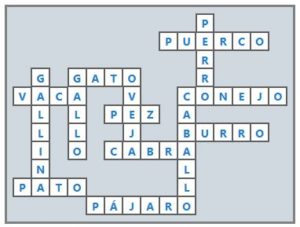 Of all the fun ways to tweak your Spanish language skills, riddles are at the top of the list. When you solve riddles it is like a mini language immersion; the challenges of reading, translating, comprehending, and responding to the riddle use all your Spanish language skills.
Of all the fun ways to tweak your Spanish language skills, riddles are at the top of the list. When you solve riddles it is like a mini language immersion; the challenges of reading, translating, comprehending, and responding to the riddle use all your Spanish language skills.
Often the answer to the riddle is not as obvious as you might think; you need to interpret the words before you can truly grasp their meanings. That’s when your Spanish language vocabulary skills kick in. And that’s when your Spanish language vocabulary skills also expand, but without the boredom of rote memorization. You are learning new words every time you translate the riddle, look up a word, and put everything into context.
Context is what seals the deal! Instead of memorizing Spanish language vocabulary lists without any connection to real sentences, you are viewing the new words as they are laid out in normal usage, as if someone were talking or writing to you. Your brain loves this! When you exercise your brain using this process, you retain the new information so much faster, and more completely.
Retaining vocabulary is often a Spanish language student’s biggest challenge. Puzzles teach you new words while you are enjoying yourself. When you meet the challenge, you expand your vocabulary, and absorb proper word placement in sentences, as well!
Grammar and word placement in Spanish language sentences is learned from your books and in your courses, but when you view a sentence in a riddle, or in any puzzle that asks questions, you become adjusted to the formation of the sentence without really thinking about it. That’s because the puzzles make you focus on the meaning of the words and on the answers you need to provide. The more puzzles you try to do, the more accustomed to the sentence formations you become. Learning correct sentence structure is actually secondary to the puzzle questions and answers, but this is no less effective than hours of study.
Here are a couple of riddles that are fun to solve while you practice your language skills. Give it a try!
Me formo en el cielo,
con gran alborozo;
y de lindos colores,
hago un arco hermoso.
¿Qué es?_______
Soy chiquito,
soy bonito;
mi casa llevo
sobre mi lomito.
¿Qué es?________
For more Spanish language learning tips visit mariaoliveira.com 🙂


 You can play these in the car, around the house, even on your MP3 player so that you have vocabulary learning going on whether you are driving, doing dishes, or taking your daily walk. CDs can be stopped and started, repeated and replayed, and hundreds of words are available to you. They are good for self-testing and reviewing, and they are convenient for almost all situations. The most significant advantage to CDs is that you can hear the correct pronunciation; when you repeat the word you are hearing, you get to focus on the sounds as well as the meaning.
You can play these in the car, around the house, even on your MP3 player so that you have vocabulary learning going on whether you are driving, doing dishes, or taking your daily walk. CDs can be stopped and started, repeated and replayed, and hundreds of words are available to you. They are good for self-testing and reviewing, and they are convenient for almost all situations. The most significant advantage to CDs is that you can hear the correct pronunciation; when you repeat the word you are hearing, you get to focus on the sounds as well as the meaning. Certainly there is more to language than
Certainly there is more to language than 
 Practice lessons can be repeated as often as necessary enabling students to learn at their own pace. This online course is an excellent beginning for Portuguese natives who are planning to live in an English-speaking country, and it is equally practical for visitors who need English language skills for touring or doing business internationally.
Practice lessons can be repeated as often as necessary enabling students to learn at their own pace. This online course is an excellent beginning for Portuguese natives who are planning to live in an English-speaking country, and it is equally practical for visitors who need English language skills for touring or doing business internationally.